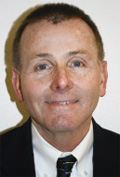Substance abuse panel educates students


Chief Jim Fitzpatrick
Drug abuse and substance abuse are prevalent in American society, which means it extends to the OCCC campus, said college Police Chief Jim Fitzpatrick.
“It all stems from one overriding major factor and that is the insatiable need of Americans to alter their behavior,” Fitzpatrick said.
Fitzpatrick was one of three panelists at a campus program on drug abuse and treatment options in late September.
The list of substances is long, including alcohol, marijuana, heroin, crack-cocaine, crystal meth, and prescription drugs.
According to Fitzpatrick’s statistics, over half of all criminal offenders are convicted of drug or alcohol crimes, while there has been a 10 percent increase over the last 10 years in drug crimes.
Illicit drugs come from all over the world, Fitzpatrick said. They include “ice” imported from Latin America, “BC weed” from British Columbia, heroin from Afghanistan and Asia, or prescription pills from the average household medicine cabinet.
The worldwide drug trade maintains a strong foothold in America, and neither Oklahoma City nor OCCC is immune to its long reach, he said.
Fitzpatrick is a former Narcotics Special Investigations commander and 35-year veteran of the Oklahoma City Police Department.
Deanna Harris, Cher A. Bumps and Associates representative, told the audience of 35 that OCCC contracts with her company, known as CABA, to provide substance abuse evaluation and rehabilitation services for students, faculty and their families.
“If a situation arises that a family member or you yourself are struggling with this, you can call us,” she said.
“It’s all confidential; we are located way off campus so confidentiality is a big deal.”
Harris also provided information from the State Department of Mental Health and Substance Abuse.
“They also have a reach-out hotline you can call if you don’t want to call us and just want some information,” she said.
The number, 1-800-522-9054, would put callers in touch with treatment centers in their area.
Student Support Services counselor Jenna Howard told about free mental health counseling programs available through OCCC.
“We counsel students from 8 a.m. to 8 p.m. Monday through Thursday, and 8 a.m. to 5 p.m. on Friday.”
A part-time counselor comes in the evenings, Howard said. Counseling is free for students because it’s included in student fees.
One student said much of the information in the program was news to her.
“I came from a high school where using drugs was not cool at all,” said Holly Hudson, a 20-year-old nursing student from Mustang.
“Nobody worth anything did drugs so I’ve had no experience with it.
“The program was very informative. We need more education about it.”
The seminar touched home with 50-year-old Anna Nowell.
“I’ve experienced it personally,” she said.
“I was married to a man who was abusive with both alcohol and drugs.
“It’s a generational thing. Back then everyone did it and it wasn’t a big deal.
“I think this program should have been out in the cafeteria or something where all the students could have accessed it, not just nursing students.
“I didn’t even know we had counseling services available.”
The panel closed by taking questions and discussing safety on campus, including a network of over 200 security cameras.
For information about on-campus counseling services, call 405-682-7520 or email dshuman@occc.edu.
For CABA, call 405-840-0231.
To contact Stephanie Luna,
email onlineeditor@occc.edu